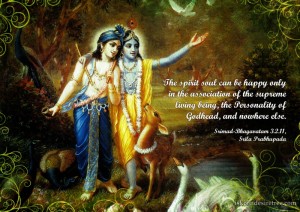
Hare Krishna and pranams dear devotees,
The stellar role accomplished by the troika of Srila Bhaktivinoda Thakur, Srila Bhaktisiddhanta Saraswati Thakur and Srila A.C. Bhaktivedanta Swami Prabhupada, to re-establish, reinforce and then broadcast the lost teachings of Sri Caitanya Mahaprabhu is incomparable. Their genius in understanding the unique mood of Sri Caitanya Mahaprabhu and the six Goswamis is also exceptional.
Recently I read an article written by Srila Bhaktivinod Thakura on the famous quote from Bible ‘Love God with all thy heart, with all thy mind, with all thy soul’. This amazing article not only gives us a proper understanding of how ‘To Love God’ means different to different people at different levels of consciousness but he also beautifully explains in brielf the whole Gaudiya Vaisnava philosophy. Here it is –
To Love God
It was Christ Jesus who first said “Love God with all thy heart, with all thy mind, with all thy soul, and with all thy strength, and love man as thy brother.” This is an absolute truth indeed; but different men put different interpretations to this noble expression. The expressions of all great men are nice but somewhat mysterious. When understood they bring the truth nearest to the heart otherwise they remain mere letters that ‘kill’. The reason of the mystery is that men, advanced in their approach to the Deity, are in the habit of receiving revelations which are but mysteries to those that are behind them. The stages of progress are very much the same as the circles of spiritualism which, though not true themselves, explain a great deal about the gradual development of the soul.
We have understood some spiritualists to maintain that matter when sublimated converts itself to spirit. This theory is indeed against any inward conviction. Matter is matter, and spirit is spirit; one of them cannot form the other. Spirit is certainly of a superior existence; though we cannot fully understand in our present state of material imprisonment, what relation Spirit does exactly bear to matter, space and time.
Metaphysics apart, we decide that the human soul rises higher and higher and can understand things of which we have no idea at present. Subject to this important rule, Christ Jesus of Nazareth received and uttered the words quoted above.
To readers who are a little above the scale of ordinary men, these expressions of Jesus teach that man should love God with all his heart (meaning the affections of the heart perceivable in all children as opposed to hate), with all his mind, (meaning the intellect which knows as opposed to ignorance of good things), with all his soul (meaning that principle of the human constitution which worships the Almighty and feels its own immortality), and with all his strength (meaning all active work). To the inspired, however, more things and better and more sublime meanings appear beneath these holy words of the inspired Jesus. He teaches man to love God and not to know, infer, hate, or think of God. He tells us that man in his absolute state is not the intellect or the body but is the pure soul itself.
The essence of the soul is wisdom and its action is love absolute. The absolute condition of man is his absolute relation to the Deity in pure love. Love then alone is the religion of the soul and consequently of the whole man. The pupil asks here, “What have I to do with the heart? — My heart loves ‘to see the sun smile, to eat the sweetest dish and to see a dance.’ Jesus profoundly replies “Yes, you must love God with all thy heart, your heart now runs to things other than God, but you must, as you train a bad horse, make your feelings run to the loving God.” This is one of the four principles of worship or what they call in Vaisnava literature, santa rasa.
Then the pupil says, “My Lord, the intellect takes me elsewhere from God, that is, it wants to take me to positivism; please instruct me what am I to do?” “Yes,” replies Jesus, “You must love God with all your mind, that is, when you perceive, conceive, remember, imagine and reason, you must not allow yourself to be a dry thinker but must love. Love alone can soften the dryness of the intellect, you must develop the intellect on all good and holy things by means of love of truth, spiritual beauty and harmony.” This is the second phase of Vaisnava development which passes by the name dasya rasa.
The pupil then inquires whether development of the affections and the intellect is quite enough for him. Then says the Lord “You must love God with thy soul also, that is, you must perceive yourself in spiritual communication with the Deity and receive holy revelations in your sublimest hours of worship.” This is called the sakhya rasa of the Vaisnavas — the soul approaching the Deity in holy and fearless service.
The disciple apprehends that he will be lost in such a position and will be unable to act. Then the Saviour tells him these words, “You must love God with all thy strength or will — you are wrong in concluding that you will loose your active existence — you will get it the more. Work for God and work to God, proceeding from no interested views but from a holy free will (which is alone the strength of man) and identifying with pure love, it will fully engross your attention.” This is a description of bhakti in general.
Then Jesus proceeds to tell us, “You must love man as thy brother.” From this is inferred the fourth phase of love which is a feeling that all men are brothers and God is their common Father. This is vatsalya rasa in its first stage of development.
Bhakti (love) is thus perceived in the very first development of man in the shape of heart, then in the shape of mind, then in the shape of soul and lastly in the shape of will. These shapes do not destroy each other but beautifully harmonize themselves into a pure construction of what we call the spiritual man or the ekanta of Vaisnava literature.
But there is another more sublime truth behind this fact which is revealed to a few that are prepared for it. We mean the spiritual conversion of the soul into a woman. It is in that sublime and lofty state in which the soul can taste the sweetness of an indissoluble marriage with God of Love. The fifth or the highest stage of Vaisnava development is this, which we call madhurya rasa, and on this alone the most beautiful portion of the Vaisnava literature so ably expatiates.
This phase of human life, mysterious as it is, is not attainable by all, nay, we should say, by any but “God’s own“. It is so very beyond the reach of common men that the rationalists and even the ordinary theists cannot understand it. Nay, they go so far as to sneer at it as something unnatural. Oh God! Reveal Thy most valuable truths to all so that “Your own” may not be numbered with the fanatics and the crazed and that the whole of mankind may be admitted as “Your own.”
(Reprinted from a Journal of Tajpur dated Friday, 25th August, 1871)
I hope we liked the illuminating peek, which Srila Bhaktivinoda Thakura mercifully allow us, into a heart which is sold-out to the teachings and instructions of Sri Caitanya Mahaprabhu. We may scratch our head at some of the above topics, fortunately, our way of gaining access into higher topics is by first praying and then reading it repeatedly.
All glories to Srila Bhaktivinod Thakura
All glories to Srila Prabhupada
your servant,
Giriraj dasa


